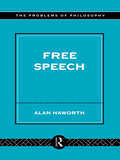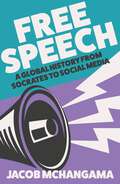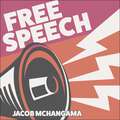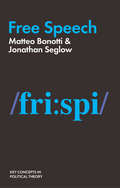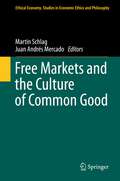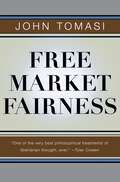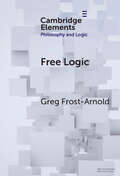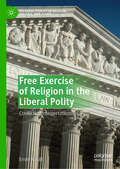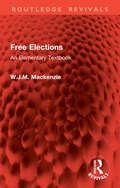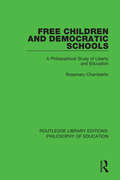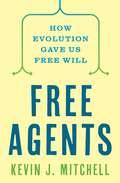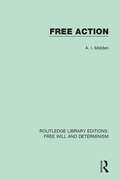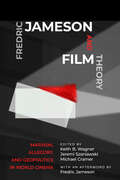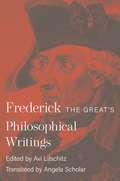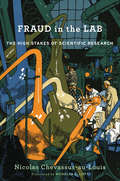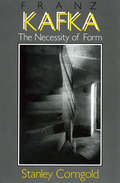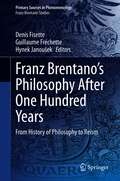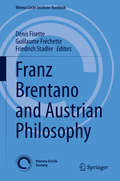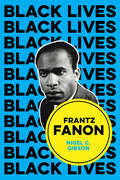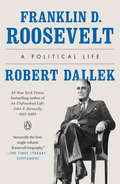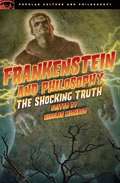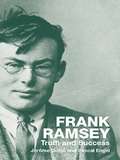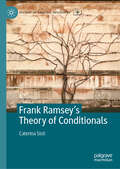- Table View
- List View
Free Speech: All That Matters Ebook (Problems of Philosophy)
by Alan HaworthFree Speech is a philosophical treatment of a topic which is of immense importance to all of us.Writing with great clarity, wit, and genuine concern, Alan Haworth situates the main arguments for free speech by tracing their relationship to contemporary debates in politics and political philosophy, and their historical roots to earlier controversies over religious toleration.Free Speech will appeal to anyone with an interest in philosophy, politics and current affairs.
Free Speech: A Global History from Socrates to Social Media
by Jacob MchangamaA global history of free speech, from the ancient world to today.Hailed as the "first freedom," free speech is the bedrock of democracy. But it is a challenging principle, subject to erosion in times of upheaval. Today, in democracies and authoritarian states around the world, it is on the retreat.In Free Speech, Jacob Mchangama traces the riveting legal, political, and cultural history of this idea. Through captivating stories of free speech's many defenders - from the ancient Athenian orator Demosthenes and the ninth-century freethinker al-Razi, to Mary Wollstonecraft, Mahatma Gandhi, Nelson Mandela and modern-day digital activists - Mchangama demonstrates how the free exchange of ideas underlies all intellectual achievement and has enabled the advancement of both freedom and equality worldwide. Yet the desire to restrict speech is also a constant, and he explores how even its champions can be led down this path when the rise of new and contrarian voices challenge power and privilege of all kinds.Meticulously researched, deeply humane and provocative, Free Speech challenges us all to recognise how much we have gained from this principle - and how much we stand to lose without it.
Free Speech: A Global History from Socrates to Social Media
by Jacob MchangamaA global history of free speech, from the ancient world to today.Hailed as the "first freedom," free speech is the bedrock of democracy. But it is a challenging principle, subject to erosion in times of upheaval. Today, in democracies and authoritarian states around the world, it is on the retreat.In Free Speech, Jacob Mchangama traces the riveting legal, political, and cultural history of this idea. Through captivating stories of free speech's many defenders - from the ancient Athenian orator Demosthenes and the ninth-century freethinker al-Razi, to Mary Wollstonecraft, Mahatma Gandhi, Nelson Mandela and modern-day digital activists - Mchangama demonstrates how the free exchange of ideas underlies all intellectual achievement and has enabled the advancement of both freedom and equality worldwide. Yet the desire to restrict speech is also a constant, and he explores how even its champions can be led down this path when the rise of new and contrarian voices challenge power and privilege of all kinds.Meticulously researched, deeply humane and provocative, Free Speech challenges us all to recognise how much we have gained from this principle - and how much we stand to lose without it.(P) 2022 Hodder & Stoughton Limited
Free Speech and Unfree News
by Sam LebovicDoes America have a free press? Many who say yes appeal to First Amendment protections against censorship. Sam Lebovic shows that free speech, on its own, is not sufficient to produce a free press and helps us understand the crises that beset the press amid media consolidation, a secretive national security state, and the daily newspaper's decline.
Free Speech (Key Concepts in Political Theory)
by Matteo Bonotti Jonathan SeglowFreedom of speech is never very far away from political controversy. In recent years, the rise of populism, the ‘cancel culture’ phenomenon, and online hate attacks are among the developments that have kept it at the forefront of both public and academic discussion. In this new introduction to the subject, Matteo Bonotti and Jonathan Seglow offer an accessible analysis of debates around freedom of speech. They introduce and critically examine three major philosophical arguments for freedom of speech that are based on the values of truth, autonomy, and democracy. They apply these arguments to issues including hate speech, offensive speech, and pornography, and also tackle pressing current issues such as ‘fake news’ and public shaming. This book will be essential for anyone wishing to understand the contemporary significance and philosophical roots of free speech, and how it relates to debates about democracy, feminism and multiculturalism.
Free Markets and the Culture of Common Good
by Juan Andrés Mercado Martin SchlagRecent economic development and the financial and economic crisis require a change in our approach to business and finance. This book combines theology, economy and philosophy in order to examine in detail the idea that the functioning of a free market economy depends upon sound cultural and ethical foundations. The free market is a cultural achievement, not only an economic phenomenon subject to technical rules of trade and exchange. It is an achievement which lives by and depends upon the values and virtues shared by the majority of those who engage in economic activity. It is these values and virtues that we refer to as culture. Trust, credibility, loyalty, diligence, and entrepreneurship are the values inherent in commercial rules and law. But beyond law, there is also the need for ethical convictions and for global solidarity with developing countries. This book offers new ideas for future sustainable development and responds to an increasing need for a new sense of responsibility for the common good in societal institutions and good leadership.
Free Market Fairness
by John TomasiA provocative new vision of free market capitalism that achieves liberal ends by libertarian meansCan libertarians care about social justice? In Free Market Fairness, John Tomasi argues that they can and should. Drawing simultaneously on moral insights from defenders of economic liberty such as F. A. Hayek and advocates of social justice such as John Rawls, Tomasi presents a new theory of liberal justice. This theory, free market fairness, is committed to both limited government and the material betterment of the poor. Unlike traditional libertarians, Tomasi argues that property rights are best defended not in terms of self-ownership or economic efficiency but as requirements of democratic legitimacy. At the same time, he encourages egalitarians concerned about social justice to listen more sympathetically to the claims ordinary citizens make about the importance of private economic liberty in their daily lives. In place of the familiar social democratic interpretations of social justice, Tomasi offers a "market democratic" conception of social justice: free market fairness. Tomasi argues that free market fairness, with its twin commitment to economic liberty and a fair distribution of goods and opportunities, is a morally superior account of liberal justice. Free market fairness is also a distinctively American ideal. It extends the notion, prominent in America's founding period, that protection of property and promotion of real opportunity are indivisible goals. Indeed, according to Tomasi, free market fairness is social justice, American style.Provocative and vigorously argued, Free Market Fairness offers a bold new way of thinking about politics, economics, and justice—one that will challenge readers on both the left and right.
Free Logic: A Generalization (Elements in Philosophy and Logic)
by Greg Frost-ArnoldClassical logic assumes that names are univocal: every name refers to exactly one existing individual. This Principle of Univocality has two parts: an existence assumption and a uniqueness assumption. The existence assumption holds that every name refers to at least oneindividual, and the uniqueness assumption states that every name refers to at most one individual. The various systems of free logic which have been developed and studied since the 1960s relax the existence assumption, but retain the uniqueness assumption. The present work investigates violations of both halves of the Principle of Univocality. That is, whereas the free logics developed from the 1960s are called 'free' because they are free of existential assumptions, the current Element generalizes this idea, to study logics that are free of uniqueness assumptions. We explore several versions of free logic, comparing their advantages and disadvantages. Applications of free logic to other areas of philosophy are explored.
Free Listening (Provocations)
by Naomi Waltham-SmithFree Listening offers a radical reframing of seemingly intractable debates and polarized positions on free speech, academic freedom, systemic injustice, and political dissent by shifting attention from our voices to our ears. Instead of reclaiming the terrain of free speech that is increasingly ceded to conservatives, Naomi Waltham-Smith argues that progressives should assume a more radical task—to liberate listening from those frameworks that have determined what freedom looks like, who enjoys it, and at what cost. Refocusing on aural responsiveness forces a confrontation with the liberal tradition that has traditionally anchored claims for freedom of expression and inquiry. If listening is placed at the heart of public deliberation and disagreeing well, the relational, open-ended, and unpredictable character of free expression becomes a common good. In a wide-ranging critical reflection on issues from civility to criticality, righteous anger to gentle listening, and silencing to streaming platforms, Free Listening makes an ambitious contribution to sound studies and political philosophy. Weaving together deconstruction, Black political thought, and decolonial theory, Waltham-Smith argues that the retort to accusations of &“cancel culture&” should be a revival of abolition democracy.
Free Exercise of Religion in the Liberal Polity: Conflicting Interpretations (Palgrave Studies in Religion, Politics, and Policy)
by Emily R. GillThis book addresses the challenge of providing for the free exercise of religion without allowing religious exercise by some individuals and groups to impinge upon the conscientious convictions of others. State neutrality toward religion is impossible, because neutrality means inattention to religion for some, but leveling the playing field through accommodations or exemptions for others. Both formal and substantive neutrality have a place in addressing particular conflicts. One such example is public funding for religiously affiliated social service programs, for which neither type of neutrality is satisfactory and thus some restrictions are justifiable; conversely, private voluntary organizations that do not receive direct public funding should be allowed wide latitude regarding their practices. This title also examines the expansive free exercise claims that are now made by those who argue that following the law impinges upon their beliefs, as exemplified by the ministerial exception and the Hobby Lobby and Masterpiece Cakeshop Supreme Court cases. It concludes by analyzing the relationship between neutrality and marriage as a civil status, which impacts a variety of commitment types and plural marriage.
Free Elections: An Elementary Textbook (Routledge Revivals)
by W.J.M. MackenzieOriginally published in 1958 at a time when many African and Asian nations were newly independent or going through the process of independence, this book sets out the facts and arguments which have to be considered in designing and running electoral systems. The book treats the problems of free elections in Africa and Asia objectively and uncontroversially, without pre-supposing any previous training in political science. The discussion of 'free elections' raises large issues about political norms and ideologies and about the working of political systems in different societies, and the book tackles these questions head on. The book gives a balanced account of the whole issue of elections, covering on the one hand qualifications and voting systems, and on the other hand less ‘political’ questions of administration and control, which are of equal importance in the working of an electoral system.
Free Children and Democratic Schools: A Philosophical Study of Liberty and Education (Routledge Library Editions: Philosophy of Education #6)
by Rosemary ChamberlinThis book, first published in 1989, relates a theory of liberty to the practice of education, and reveals the implications of beliefs about freedom for our schools and classrooms. The author makes a reasoned plea for society to have more respect for children and not treat them as an inferior sub-species. The central argument of this book is for greater education in democracy, and greater democracy in education. This title will be of interest to students of the philosophy of education.
Free Agents: How Evolution Gave Us Free Will
by Kevin J. MitchellAn evolutionary case for the existence of free willScientists are learning more and more about how brain activity controls behavior and how neural circuits weigh alternatives and initiate actions. As we probe ever deeper into the mechanics of decision making, many conclude that agency—or free will—is an illusion. In Free Agents, leading neuroscientist Kevin Mitchell presents a wealth of evidence to the contrary, arguing that we are not mere machines responding to physical forces but agents acting with purpose.Traversing billions of years of evolution, Mitchell tells the remarkable story of how living beings capable of choice arose from lifeless matter. He explains how the emergence of nervous systems provided a means to learn about the world, granting sentient animals the capacity to model, predict, and simulate. Mitchell reveals how these faculties reached their peak in humans with our abilities to imagine and to be introspective, to reason in the moment, and to shape our possible futures through the exercise of our individual agency. Mitchell&’s argument has important implications—for how we understand decision making, for how our individual agency can be enhanced or infringed, for how we think about collective agency in the face of global crises, and for how we consider the limitations and future of artificial intelligence.An astonishing journey of discovery, Free Agents offers a new framework for understanding how, across a billion years of Earth history, life evolved the power to choose, and why it matters.
Free Action (Routledge Library Editions: Free Will and Determinism #3)
by A.I. MeldenThat a science of human conduct is possible, that what any man may do even in moments of the most sober and careful reflection can be understood and explained, has seemed to many a philosopher to cast doubt upon our common view that any human action can ever be said to be truly free. This book, first published in 1961, looks into crucially important issues that are often ignored in the familiar arguments for and against the possibility of free action. These issues are brought to light and examined in some detail.
Fredric Jameson and Film Theory: Marxism, Allegory, and Geopolitics in World Cinema
by John Mackay Dudley Andrew Jeremi Szaniawski Fredric Jameson Pansy Duncan Michael Cramer Paul Coates Dan Hassler-Forest Naoki Yamamoto Mike Wayne Keith B. Wagner Alvin K. Wong Mercedes VazquezFrederic Jameson and Film Theory is the first collection of its kind, it assesses and critically responds to Fredric Jameson’s remarkable contribution to film theory. The essays assembled explore key Jamesonian concepts—such as totality, national allegory, geopolitics, globalization, representation, and pastiche—and his historical schema of realism, modernism, and postmodernism, considering, in both cases, how these can be applied, revised, expanded and challenged within film studies. Featuring essays by leading and emerging voices in the field, the volume probes the contours and complexities of neoliberal capitalism across the globe and explores world cinema's situation within these forces by deploying and adapting Jamesonian concepts, and placing them in dialogue with other theoretical paradigms. The result is an innovative and rigorously analytical effort that offers a range of Marxist-inspired approaches towards cinemas from Asia, Latin America, Europe, and North America in the spirit of Jameson's famous rallying cry: 'always historicize!'.
Frederick the Great's Philosophical Writings
by King Frederick IIThe first modern English edition of diverse Enlightenment-era writings by Prussian monarch Frederick the GreatFrederick II of Prussia (1712–1786), best known as Frederick the Great, was a prolific writer of philosophical discourses, poems, epics, satires, and more, while maintaining extensive correspondence with prominent intellectuals, Voltaire among them. This edition of selected writings, the first to make a wide range of Frederick’s most important ideas available to a modern English readership, moves beyond traditional attempts to see his work only in light of his political aims. In these pages, we can finally appreciate Frederick’s influential contributions to the European Enlightenment—and his unusual role as a monarch who was also a published author.In addition to Frederick’s major opus, the Anti-Machiavel, the works presented here include essays, prefaces, reviews, and dialogues. The subjects discussed run the gamut from ethics to religion to political theory. Accompanied by critical annotations, the texts show that we can understand Frederick’s views of kingship and the state only if we engage with a broad spectrum of his thought, including his attitudes toward morality and self-love. By contextualizing his arguments and impact on Enlightenment beliefs, this volume considers how we can reconcile Frederick’s innovative public musings with his absolutist rule. Avi Lifschitz provides a robust and detailed introduction that discusses Frederick’s life and work against the backdrop of eighteenth-century history and politics.With its unparalleled scope and cross-disciplinary appeal, Frederick the Great’s Philosophical Writings firmly establishes one monarch’s multifaceted relevance for generations of readers and scholars to come.
Fraud in the Lab: The High Stakes of Scientific Research
by Nicolas Chevassus-au-LouisFrom manipulated results and fake data to retouched illustrations and plagiarism, cases of scientific fraud have skyrocketed in the past two decades. In a damning exposé, Nicolas Chevassus-au-Louis details the circumstances enabling the decline in scientific standards and highlights efforts to curtail future misconduct.
Franz Kafka: The Necessity of Form
by Stanley CorngoldIn Stanley Corngold’s view, the themes and strategies of Kafka’s fiction are generated by a tension between his concern for writing and his growing sense of its arbitrary character. Analyzing Kafka’s work in light of "the necessity of form," which is also a merely formal necessity, Corngold uncovers the fundamental paradox of Kafka’s art and life. The first section of the book shows how Kafka’s rhetoric may be understood as the daring project of a man compelled to live his life as literature. In the central part of the book, Corngold reflects on the place of Kafka within the modern tradition, discussing such influential precursors of Cervantes, Flaubert, and Nietzsche, whose works display a comparable narrative disruption. Kafka’s distinctive narrative strategies, Corngold points out, demand interpretation at the same time they resist it. Critics of Kafka, he says, must be aware that their approaches are guided by the principles that Kafka’s fiction identifies, dramatizes, and rejects.
Franz Brentano’s Philosophy After One Hundred Years: From History of Philosophy to Reism (Primary Sources in Phenomenology)
by Denis Fisette Guillaume Fréchette Hynek JanoušekThis volume brings together contributions that explore the philosophy of Franz Brentano. It looks at his work both critically and in the context of contemporary philosophy. For instance, Brentano influenced the phenomenology of Edmund Husserl, the theory of objects of Alexius Meinong, the early development of the Gestalt theory, the philosophy of language of Anton Marty, the works of Carl Stumpf in the psychology of tone, and many others. Readers will also learn the contributions of Brentano's work to much debated contemporary issues in philosophy of mind, ontology, and the theory of emotions. The first section deals with Brentano’s conception of the history of philosophy. The next approaches his conception of empirical psychology from an empirical standpoint and in relation with competing views on psychology from the period. The third section discusses Brentano’s later programme of a descriptive psychology or “descriptive phenomenology” and some of his most innovative developments, for instance in the theory of emotions. The final section examines metaphysical issues and applications of his mereology. His reism takes here an important place. The intended readership of this book comprises phenomenologists, analytic philosophers, philosophers of mind and value, as well as metaphysicians. It will appeal to both graduate and undergraduate students, professors, and researchers in philosophy and psychology.
Franz Brentano and Austrian Philosophy (Vienna Circle Institute Yearbook #24)
by Friedrich Stadler Denis Fisette Guillaume FréchetteThe book discusses Franz Brentano’s impact on Austrian philosophy. It contains both a critical reassessment of Brentano’s place in the development of Austrian philosophy at the turn of the 20th century and a reevaluation of the impact and significance of his philosophy of mind or ‘descriptive psychology’ which was Brentano's most important contribution to contemporary philosophy and to the philosophy in Vienna. In addition, the relation between Brentano, phenomenology, and the Vienna Circle is investigated, together with a related documentation of Brentano's disciple Alfred Kastil (in German). The general part deals with the ongoing discussion of Carnap's "Aufbau" (Vienna Circle Lecture by Alan Chalmers) and the philosophy of mind, with a focus on physicalism as discussed by Carnap and Wittgenstein (Gergely Ambrus). As usual, two reviews of recent publications in the philosophy of mathematics (Paolo Mancosu) and research on Otto Neurath's lifework (Jordi Cat/Adam Tuboly) are included as related research contributions. This book is of interest to students, historians, and philosophers dealing with the history of Austrian and German philosophy in the 19th and 20th century.
Frantz Fanon: Combat Breathing (Black Lives)
by Nigel C. GibsonRevolutionary humanist and radical psychiatrist Frantz Fanon was one of the greatest Black thinkers of the twentieth century. Born in Martinique and known for his involvement in the Algerian liberation movement, his seminal books Black Skin, White Masks and The Wretched of the Earth are widely considered to be cornerstones of anti-colonial and anti-racist thought.In this essential introduction to Fanon’s remarkable life and philosophy, Nigel C. Gibson argues that Fanon’s oeuvre is essential to thinking about race today. Connecting Fanon’s writing, psychiatric practice, and lived experience in the Caribbean, France, and Africa, Gibson reveals (with startling clarity) his philosophical commitments and the vision of revolution that he stood for. Despite his untimely death, the revolutionary pulse of Fanon’s ideas has continued to beat ever more strongly in the consciousness of successive revolutionary generations, from the Black Panthers and the Black Power to Black Lives Matter.As Fanon’s thought comes alive to new activists thinking about their mission to “humanize the world,” Gibson reminds us that that Fanon’s revolutionary humanism is fundamental to all forms of anti-colonial struggle, including our own.
Franklin D. Roosevelt: A Political Life
by Robert Dallek“In a period defined by division, gridlock and tweet storms, Dallek crafts a pointillist portrait of the four-term president” —Peter M. Gianotti, Newsday“Will rank among the standard biographies of its subject” —Publishers WeeklyA one-volume biography of Roosevelt by the #1 New York Times bestselling biographer of JFK, focusing on his career as an incomparable politician, uniter, and deal maker In an era of such great national divisiveness, there could be no more timely biography of one of our greatest presidents than one that focuses on his unparalleled political ability as a uniter and consensus maker. Robert Dallek’s Franklin D. Roosevelt: A Political Life takes a fresh look at the many compelling questions that have attracted all his biographers: how did a man who came from so privileged a background become the greatest presidential champion of the country’s needy? How did someone who never won recognition for his intellect foster revolutionary changes in the country’s economic and social institutions? How did Roosevelt work such a profound change in the country’s foreign relations? For FDR, politics was a far more interesting and fulfilling pursuit than the management of family fortunes or the indulgence of personal pleasure, and by the time he became president, he had commanded the love and affection of millions of people. While all Roosevelt’s biographers agree that the onset of polio at the age of thirty-nine endowed him with a much greater sense of humanity, Dallek sees the affliction as an insufficient explanation for his transformation into a masterful politician who would win an unprecedented four presidential terms, initiate landmark reforms that changed the American industrial system, and transform an isolationist country into an international superpower. Dallek attributes FDR’s success to two remarkable political insights. First, unlike any other president, he understood that effectiveness in the American political system depended on building a national consensus and commanding stable long-term popular support. Second, he made the presidency the central, most influential institution in modern America’s political system. In addressing the country’s international and domestic problems, Roosevelt recognized the vital importance of remaining closely attentive to the full range of public sentiment around policy-making decisions—perhaps FDR’s most enduring lesson in effective leadership.
Frankenstein and Philosophy
by Nicolas MichaudMary Shelley's novel Frankenstein: The Modern Prometheus sparked into life a fascination with science-gone-awry that refuses to die. From 1818 to present-day Hollywood, the story of Victor Frankenstein and his reanimated, stitched-together corpse has inspired (some would say) the very idea of modern science fiction and countless essays, movies, novels, songs, comic-books, and TV shows aiming to capture what was right, wrong, abominable, inevitable, scary, or funny in this classic tale.Can organic life be reanimated using electricity or genetic manipulation? If so, could Frankenstein's monster really teach itself to read and speak as Mary Shelley imagined? Do monsters have rights, or responsibilities to those who would as soon kill them? What is it about music that so affects Frankenstein's monster, or any of us? What does Mel Brook's Frau Blucher say to contemporary eco-feminism? Why are some Frankenstein's flops and others historic successes? Is there a true Frankenstein? Why are children, but not adults, drawn to Shelley's monster? And what is a "monster," anyways?Frankenstein and Philosophy brings 25 philosophers to stitch together these and other questions as they apply the history of philosophy to history's greatest horror franchise. Some chapters treat the Frankenstein films, others the original novel, and yet others the many comic books, novels, and modern adaptations. Together they pay tribute to perhaps the most enduring pop culture icon and the fundamental fears, hopes, questions, and puzzles it raises.
Frank Ramsey: Truth and Success
by Pascal Engel Jérôme DokicDespite his tragic death at the age of 26, Frank Ramsey (1903 - 1930) remains one of the most intriguing minds of the twentieth century. His thought had a profound influence on both Ludwig Wittgenstein and Bertrand Russell, and many strands of contemporary analytic philosophy find their origin in Ramsey's ideas. Frank Ramsey: Truth and Success provides a much-needed introduction to the work of this undervalued thinker, and makes an important and profound contribution to our understanding of Ramsey's work and his place in twentieth century philosophy. It will be of interest to all students of logic, metaphysics and the history of philosophy.
Frank Ramsey's Theory of Conditionals (History of Analytic Philosophy)
by Caterina SistiThis book provides the first fully developed account of Frank Ramsey's theory of conditionals. It is divided into two parts. The first part of the book is historical, investigating Ramsey’s texts to discover his views on conditionals. The second part systematically develops a unified account of conditionals, building on Ramsey’s ideas.
